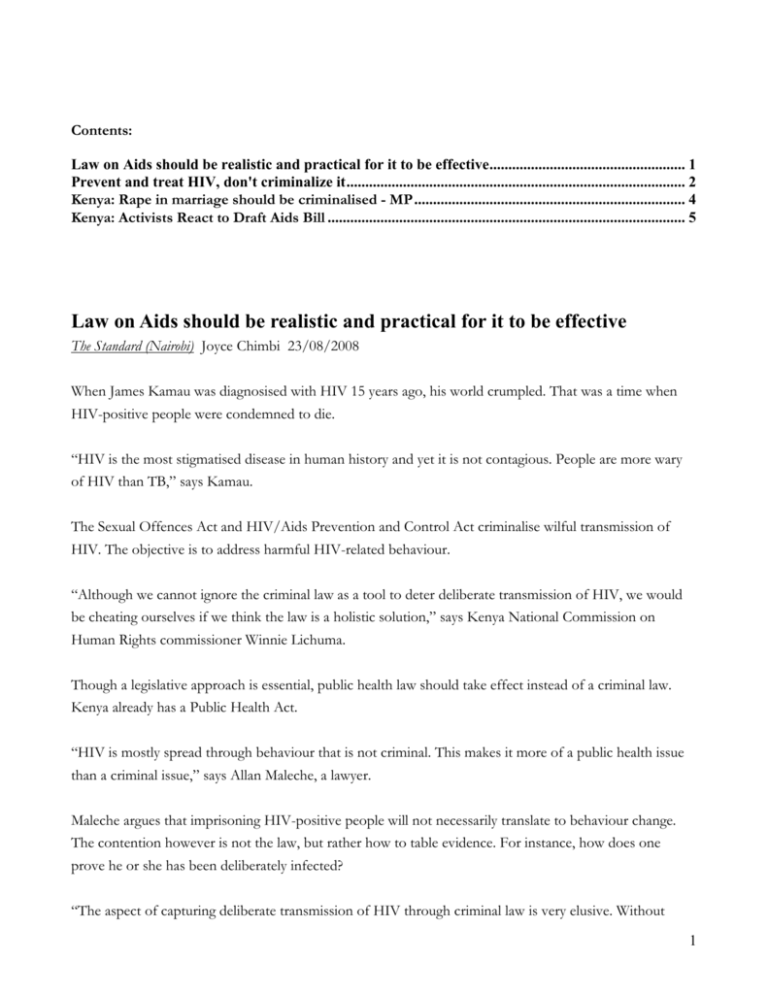
Contents:
Law on Aids should be realistic and practical for it to be effective.................................................... 1
Prevent and treat HIV, don't criminalize it .......................................................................................... 2
Kenya: Rape in marriage should be criminalised - MP ........................................................................ 4
Kenya: Activists React to Draft Aids Bill ............................................................................................... 5
Law on Aids should be realistic and practical for it to be effective
The Standard (Nairobi) Joyce Chimbi 23/08/2008
When James Kamau was diagnosised with HIV 15 years ago, his world crumpled. That was a time when
HIV-positive people were condemned to die.
“HIV is the most stigmatised disease in human history and yet it is not contagious. People are more wary
of HIV than TB,” says Kamau.
The Sexual Offences Act and HIV/Aids Prevention and Control Act criminalise wilful transmission of
HIV. The objective is to address harmful HIV-related behaviour.
“Although we cannot ignore the criminal law as a tool to deter deliberate transmission of HIV, we would
be cheating ourselves if we think the law is a holistic solution,” says Kenya National Commission on
Human Rights commissioner Winnie Lichuma.
Though a legislative approach is essential, public health law should take effect instead of a criminal law.
Kenya already has a Public Health Act.
“HIV is mostly spread through behaviour that is not criminal. This makes it more of a public health issue
than a criminal issue,” says Allan Maleche, a lawyer.
Maleche argues that imprisoning HIV-positive people will not necessarily translate to behaviour change.
The contention however is not the law, but rather how to table evidence. For instance, how does one
prove he or she has been deliberately infected?
“The aspect of capturing deliberate transmission of HIV through criminal law is very elusive. Without
1
medical records, can a complainant’s claim of being HIV-negative before a sexual encounter hold water?”
poses Kamau.
The same predicament has been experienced by HIV/Aids activists in South Africa, Nigeria and Namibia.
These governments tried to criminalise wilful transmission and did not go far. Some see the law as an
instrument that can only fuel stigma. In addition, those opposed to criminal law claim it is discriminatory
and limited as a tool for HIV prevention. They argue the law could even damage important health
initiatives against HIV/Aids.
Knowing your status
In effect, it is important to deal with deliberate transmission of the virus as a socio-cultural and economic
issue rather than a criminal one. Criminalisation may, in fact, discourage people from getting tested.
Someone can easily cite ignorance of status as defence against a lawsuit.
Criminal law emphasises consent between individuals to ensure the people in question have agreed to
become intimate and are aware of each other’s HIV status. “I would say consent is where the problem
begins. We generally do not have a culture where people are aware of their status. Some of us do not even
know exactly when they got infected,” says Florence Anam of Kenya Network of Women with HIV/Aids.
Although she has lived with the virus for three years, Anam says there is no physical evidence of the illness.
Had she not been tested, she would have assumed she was HIV negative.
Attempting to employ criminal law perhaps is tantamount to putting the cart before the horse. A more
effective approach should involve creating a culture where people strive to know their status. However,
there are situations that require the law. For instance, in cases where people’s right to decide when and
with whom to have sex have been violated.
Prevent and treat HIV, don't criminalize it
Andre Picard
The Globe and Mail (Canada)
August 14, 2008
In Dallas, a 42-year-old homeless man was arrested for "harassing a public servant with a deadly weapon" a fancy way of saying he spit on a cop. Because Willie Campbell was HIV-positive, he was jailed for 35
years, even though there has never been a documented case of the AIDS virus being transmitted by saliva.
In Zimbabwe, an infected woman was arrested for having unprotected sex with her lover.
2
The woman was convicted of "deliberately infecting another person," even though the man was not
infected and did not want to press charges. She was sentenced to five years in prison.
In Windsor, Ont., Carl Leone was sentenced to 18 years in prison after being convicted of 15 counts of
aggravated sexual assault. The 32-year-old did not tell his sexual partners he was infected with HIV. Five of
the women contracted the virus. Around the world, women and men infected with HIV are increasingly
being prosecuted.
Mr. Justice Edwin Cameron of the Supreme Court of Appeal of South Africa told delegates to the
International AIDS Conference last week that the growing criminalization of HIV-AIDS is a travesty that
risks undermining progress and fuelling the epidemic.
"HIV is a virus, not a crime," he said.
Judge Cameron, who is HIV-positive himself, said there are instances in which criminal prosecutions are
appropriate, such as rape and when an infected person deliberately and knowingly spreads the virus, as in
the case of Mr. Leone in Canada. But those crimes are covered by existing legislation.
Judge Cameron said what is troublesome in a world where 33 million are infected with HIV is the creation
of special laws relating to HIV transmission and exposure.
In Egypt, for example, being infected with the AIDS virus is a crime, regardless of behaviour.
In Sierra Leone, "HIV transmission" is now a crime and the law applies to anyone who exposes another to
the virus, even without transmission. The law expressly applies to pregnant women, meaning an HIVpositive woman can be jailed for being pregnant or breastfeeding, even though there are effective measures
for preventing transmission.
Judge Cameron said HIV is a fearsome virus, but the response is largely irrational and counterproductive.
He listed 10 reasons criminal laws make for bad health policy:
1) Criminalization is ineffective: There is no proof it stops the spread of HIV.
2) Criminal laws and prosecutions are a poor substitute for measures that really protect those at risk.
3) Criminalization victimizes, oppresses and endangers women. Worldwide, the vast majority of those who
know they are infected are women, because of policies of testing them before the birth of a child.
3
4) Criminal laws and prosecutions are often unfairly and selectively applied. Those who end up being
prosecuted are sex workers, men who have sex with men, intravenous drug users and, in Western
countries, immigrants.
5) Criminalization places the blame on one person in a sexual relationship instead of responsibility on two
people. In much of the world, women are in a subordinate position and cannot protect themselves.
6) Criminal laws targeting HIV are difficult and degrading to apply. Should consensual sex be subject to
cross-examination? (Rape and the deliberate attempt to infect are different issues entirely.)
7) Many of the laws are poorly drafted and they would not pass muster in democratic states.
8) Criminalization increases stigma.
9) Criminalization is a strong disincentive to testing. And if a person is not tested, he or she will not be
treated.
10) Criminalization assumes the worst about those with HIV and punishes vulnerability.
Put simply, Judge Cameron said, "Criminalization is a poor tool for controlling HIV-AIDS. There is no
public health rationale whatsoever for invoking criminal law sanctions against those who unintentionally
transmit HIV or expose others to it."
It is also well established that countries that respect human rights and civil liberties, and encourage the
undiagnosed to be tested for HIV, do a far better job of containing the epidemic than those adopting
punitive, moralistic strategies.
The epidemic of HIV-AIDS is now in its third generation, and is likely to be with us for several more
generations.
Prevention and treatment are the main tools available to fight this plague, with a dollop of human rights on
the side. The world will never be able to prosecute away this massive public health challenge.
Kenya: Rape in marriage should be criminalised - MP
By Daily Nation (Kenya), by Mike Mwaniki | 08.31.2007
The launch was attended by among others ActionAid International (Kenya) HIV and Aids coordinator
Ludfine Anyango and the organisation’s country director, Ms Joyce Umbima. The campaign, dubbed
4
Women Won’t Wait, End HIV and Violence Against Women Now, aims at promoting women’s health
and human rights. It calls on the Government to review current laws for consistency in sentencing
perpetrators of sexual violence and those who intentionally infect others with HIV and Aids.
The campaign will be spearheaded by a group of local and international organisations fighting HIV and
Aids and violence against women and girls. Ms Ndung’u said increased cases of sexual violence against
women and girls was fuelling the spread of HIV and Aids among females. “A majority of women are
forced to engage in unprotected sex by their partners, thereby exposing them to the dangers of contracting
HIV and Aids ... It is therefore time that women and girls are allowed to take control of their bodies,” said
Ms Ndung’u.
Ms Onyango said at the household level, spouse violence was undermining adherence to anti-retroviral
treatment. “Some men who are infected with HIV but are living in denial are forcing their spouses to share
their ARVs thus making the women develop resistance due to under-dosage,” she said.
A recent study conducted in Nairobi showed that a large number of (male) condoms was bought by
women. The study called for the price of female condoms to be lowered to make them readily available to
women, since the availability of male condoms empowered only the men. Ms Ndung’u identified violence,
cultural norms, poverty and discrimination as some of the factors fuelling the spread of HIV among
females.
A recent study shows that one out of every four girls and young women in Kenya lose their virginity
through force.
Kenya: Activists React to Draft Aids Bill
UN Integrated Regional Information Networks - October 26, 2005
Kenyan AIDS lobbyists have voiced their opposition to a new HIV Bill by the Parliamentary Health
Committee that will accommodate foreign research and water down provisions protecting the rights of
HIV-positive people.
The Kenya Treatment Access Movement (KETAM) charged that the Bill would pave the way for unethical
research and weaken safeguards against arbitrary testing, which could lead to the exploitation of people
living with HIV/AIDS, as well as other human research subjects.
KETAM also noted that it would complicate the function of existing statutory AIDS organisations by
creating a new body - the Kenya HIV/AIDS Parliamentary Commission - whose role would include
overseeing the activities of the National AIDS Control Council.
James Kamau, the KETAM co-director, told the local East African Standard newspaper, "Just why
somebody wants to load Kenyans with another money-guzzling and time-wasting AIDS commission is lost
on us - the focus now should be on anti-AIDS treatment and mitigation, and not the formation of
additional bureaucracies."
[ This report does not necessarily reflect the views of the United Nations ]
5
6






